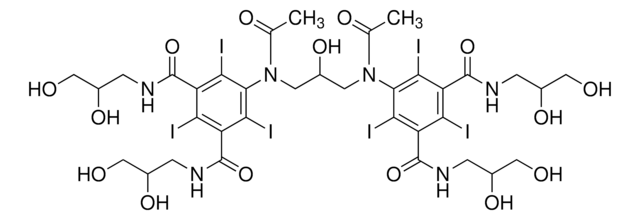88440
Poly(ethylene glycol)
BioUltra, 200
Synonym(s):
Polyethylene glycol, PEG
About This Item
Recommended Products
Quality Level
product line
BioUltra
form
liquid
mol wt
Mr 190-210
impurities
insoluble matter:, passes filter test
≤0.02% peroxides (as H2O2):
refractive index
n20/D 1.460
pH
5.5-7.0 (25 °C, 50 mg/mL in H2O)
solubility
H2O: 50 mg/mL at 25 °C, clear, colorless
density
1.124 g/mL at 20 °C
anion traces
chloride (Cl-): ≤50 mg/kg
sulfate (SO42-): ≤50 mg/kg
cation traces
Al: ≤5 mg/kg
As: ≤0.1 mg/kg
Ba: ≤5 mg/kg
Bi: ≤5 mg/kg
Ca: ≤10 mg/kg
Cd: ≤5 mg/kg
Co: ≤5 mg/kg
Cr: ≤5 mg/kg
Cu: ≤5 mg/kg
Fe: ≤5 mg/kg
K: ≤500 mg/kg
Li: ≤5 mg/kg
Mg: ≤5 mg/kg
Mn: ≤5 mg/kg
Mo: ≤5 mg/kg
Na: ≤200 mg/kg
Ni: ≤5 mg/kg
Pb: ≤5 mg/kg
Sr: ≤5 mg/kg
Zn: ≤5 mg/kg
λ
50 mg/mL in H2O
UV absorption
λ: 260 nm Amax: 0.06
λ: 280 nm Amax: 0.03
SMILES string
C(CO)O
InChI
1S/C2H6O2/c3-1-2-4/h3-4H,1-2H2
InChI key
LYCAIKOWRPUZTN-UHFFFAOYSA-N
Looking for similar products? Visit Product Comparison Guide
General description
Application
Storage Class Code
10 - Combustible liquids
WGK
WGK 1
Flash Point(F)
519.8 °F - closed cup
Flash Point(C)
271.00 °C - closed cup
Personal Protective Equipment
Certificates of Analysis (COA)
Search for Certificates of Analysis (COA) by entering the products Lot/Batch Number. Lot and Batch Numbers can be found on a product’s label following the words ‘Lot’ or ‘Batch’.
Already Own This Product?
Find documentation for the products that you have recently purchased in the Document Library.
Our team of scientists has experience in all areas of research including Life Science, Material Science, Chemical Synthesis, Chromatography, Analytical and many others.
Contact Technical Service


